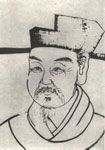底忙起侵晨
望秋怯残暑,及此东未暾。
登山俯平野,万岳皆白云。
身在白云上,不知云绕身。
底忙起侵晨。宋代。杨万里。节里少公事,底忙起侵晨。望秋怯残暑,及此东未暾。登山俯平野,万岳皆白云。身在白云上,不知云绕身。
侵晨:天快亮的时候。
残暑:残余的暑气。
登山::是指在特定要求下,运动员徒手或使用专门装备,从低海拔地形向高海拔山峰进行攀登的一项体育活动。登山运动可分为登山探险(也称高山探险)、竞技攀登(包括攀岩、攀冰等)和健身性登山。
平野:平野píngyě∶城市以外平坦空旷的地区∶广大开阔的土地
白云:1.天上白色的云朵。《诗·小雅·白华》:“英英白云,露彼菅茅。”《庄子·天地》:“乘彼白云,至於帝乡。”《史记·封禅书》:“其夜若有光,昼有白云起封中。”唐苏颋《汾上惊秋》诗:“北风吹白云,万里渡河汾。”《文汇报》1983.10.12:“《蓬莱导游图》有幅照片,蓝天之下,白云之上,嵌着蓬莱阁主要建筑,似仙山又似蜃楼。”2.黄帝时期掌管刑狱的官职。《汉书·百官公卿表上》“黄帝云师云名”颜师古注引汉应劭曰:“黄帝受命有云瑞,故以云纪事也。由是而言,故春官为青云,夏官为縉云,秋官为白云,冬官为黑云,中官为黄云。”唐孙逖《授裴敦复刑部尚书制》:“委之刑柄,俾践白云之师。”宋吴曾《能改斋漫录·事实二》:“胡武平宿,贺晏元献转刑部侍郎启云:‘紫詔疏恩,白云登秩。’”3.代指《白云谣》。唐李白《大猎赋》:“哂穆王之荒诞,歌《白云》之西母。”唐白居易《八骏图》诗:“《白云》《黄竹》歌声动,一人荒乐万人愁。”景耀月《远游》诗:“翠华芝盖入离镜,《黄竹》《白云》定古风。”参见“白云謡”。4.也可以用作思亲的意象。《旧唐书·狄仁杰传》:“其亲在河阳别业,仁杰赴并州,登太行山,南望见白云孤飞,谓左右曰:‘吾亲所居,在此云下。’瞻望佇立久之,云移乃行。”宋岳珂《桯史·开禧北征》:“夜碇中流,海光接天,星斗四垂,回首白云之思,惻然悽动。”宋赵彦卫《云麓漫钞》卷十:“梁瑄不归,璟每见东南白云即立望,惨然久之。”清黄遵宪《感怀》诗:“下阻黄壚上九天,白云望断眼空悬。”参见“白云篇”。5.可以比喻归隐。晋左思《招隐诗》之一:“白云停阴冈,丹葩曜阳林。”南朝梁陶弘景《诏问山中何所有赋诗以答》:“山中何所有?岭上多白云。只可自怡悦,不堪持寄君。”唐钱起《蓝田溪与渔者宿》诗:“一论白云心,千里沧州趣。”宋张炎《甘州》词:“载取白云归去,问谁留楚佩,弄影中州?”明徐渭《赠余君》诗:“三年卧白云,一醉抚流水。”6.专指陈抟。宋王闢之《渑水燕谈录·高逸》:“陈摶,周世宗常召见,赐号白云先生。太平兴国初,召赴闕,太宗赐御诗云:‘曾向前朝出白云,后来消息杳无闻。如今若肯随徵召,总把三峰乞与君。’”7.代指白云亭。参见“白云亭”。
不知:不知道、不明白。
绕身
《中元日晓登碧落堂,望南北山二首》是宋代诗人杨万里的作品。这首诗描绘了作者清晨登上碧落堂,俯瞰南北山脉的景象。以下是这首诗的中文译文、诗意和赏析:
中元日晓登碧落堂,
On the morning of Zhongyuan Festival, I ascend the Bi Luo Hall,
Bi Luo Hall is a place where one can have a panoramic view of the surrounding mountains.
望南北山二首。
Gazing at the southern and northern mountains.
节里少公事,底忙起侵晨。
During the festive season, there are few official duties, so I rise early in the morning,
The poet mentions that it is a festive time, possibly indicating that it is a time of leisure and tranquility.
望秋怯残暑,及此东未暾。
Looking towards autumn, fearing the lingering heat, as the eastern sky has not yet brightened.
The poet observes the approaching autumn and expresses a sense of anticipation for the relief from the lingering summer heat.
登山俯平野,万岳皆白云。
Climbing the mountain, overlooking the flat plains, all the myriad peaks are covered in white clouds.
From the vantage point of the mountain, the poet sees a breathtaking view of the vast plains and the mountains, which are enveloped in white clouds. This imagery evokes a sense of tranquility and grandeur.
身在白云上,不知云绕身。
Being on top of the white clouds, I am unaware of the clouds surrounding me.
The poet metaphorically suggests that he is so immersed in the beauty of the scene that he feels as if he is floating among the clouds, detached from the worldly concerns.
这首诗通过描绘清晨登高望远的景象,表达了诗人对自然景色的赞美和对宁静、超脱的向往。诗中运用了自然景物的描写,以及对时间和季节的感知,展现了杨万里独特的感受和思考。整首诗以简洁明快的语言,传达了作者对大自然的敬畏之情和对人生境界的追求,给人以宁静、舒适的感受。
杨万里
杨万里(1127年10月29日-1206年6月15日),字廷秀,号诚斋。吉州吉水(今江西省吉水县黄桥镇湴塘村)人。南宋著名诗人、大臣,与陆游、尤袤、范成大并称为“中兴四大诗人”。因宋光宗曾为其亲书“诚斋”二字,故学者称其为“诚斋先生”。杨万里一生作诗两万多首,传世作品有四千二百首,被誉为一代诗宗。他创造了语言浅近明白、清新自然,富有幽默情趣的“诚斋体”。杨万里的诗歌大多描写自然景物,且以此见长。他也有不少篇章反映民间疾苦、抒发爱国感情的作品。著有《诚斋集》等。...
杨万里。杨万里(1127年10月29日-1206年6月15日),字廷秀,号诚斋。吉州吉水(今江西省吉水县黄桥镇湴塘村)人。南宋著名诗人、大臣,与陆游、尤袤、范成大并称为“中兴四大诗人”。因宋光宗曾为其亲书“诚斋”二字,故学者称其为“诚斋先生”。杨万里一生作诗两万多首,传世作品有四千二百首,被誉为一代诗宗。他创造了语言浅近明白、清新自然,富有幽默情趣的“诚斋体”。杨万里的诗歌大多描写自然景物,且以此见长。他也有不少篇章反映民间疾苦、抒发爱国感情的作品。著有《诚斋集》等。
